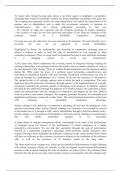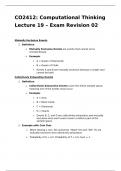To begin with, Gérard Koenig talks about a two-front aspect to highlight a competitive
advantage that would be sustainable. Indeed, his theory highlights according to his quote that
“the company must generate results over time which allow it to satisfy the expectations of its
partners and its shareholders and to make the investments necessary to maintain its
competitiveness”. The two criteria understood according to him are:
– the creation of value for customers (all the elements justifying its higher valuation).
– the creation of value for the firm itself (the perception of the financial valuation of the
company based on a profitable competitive advantage).
Favoring one over the other does not seem relevant in all situations. We must therefore try to
reconcile the two for an approach to overall profitability.
Highlighted by Porter, the sustainability and durability of competitive advantage aims to
achieve a balance in order to limit the risks of substitution or even copying by other
competing companies. Thus, its scope must be broadened because it must anticipate and adapt
to a changing context to avoid any obsolescence.
At the same time, Baron emphasizes the evolving notion of integrated strategy relating the
existing relationships and synergies between the market and non-market elements at work in
the development of the strategy. Thus, he studied Kodak integration into the Japanese market
during the 1990s under the prism of a political aspect promoting competitiveness and
innovation to familiarize himself with local demand. Reciprocal reinforcement can only be
achieved through the establishment of a virtuous circle and the presence of alternatives.
The optimal result of all strategic options aims to block the path to competition. The tools
deployed, from the protection of property through patents to the implementation of a loyalty
promotion, constitute all elements capable of disrupting rival advances. In addition, support
provided by the authorities through the approval of favorable policies also represents a major
option for domestication and the conquest of competitive advantages by the firm. Both at
work on political and market strategies, the company promotes the quest for sustainable and
significant performance compared to other firms. The central element desired lies at the heart
with obtaining a sustainable competitive advantage.
Studies relating to the definition of competitive advantage do not omit the ambiguity of the
question concerning value creation. Indeed, winning over customers is not enough to succeed
in the market nor is it enough to fully satisfy shareholders through a bold investment policy.
On the contrary, it is the pursuit of profitability at all levels and the definition of performance
that will enable sustainable margins to be generated.
A major theme of strategic management theory corresponds to the study of the justifications
of strategies given the success of the performance of certain companies in a highly
competitive environment. We can link this superiority through the gain of performance
focused on a sustainable competitive advantage which promotes greatly increased value
creation. Koenig's thesis highlights the difficulty of playing on the value creation factor which
will have an influence on the customer's decision in relation to the conditions of the reference
offer as well as the relevance of its business model in the long term. .
The firms stand out in a unique way. Some opt for superficial differentiation of their offerings
with similar resources. Others act radically to offer an original version around differentiated
resources with an option limiting the risks of imitation. In terms of price, the consumer finds
himself when the perceived value of the product seems to correspond to the price displayed by
advantage that would be sustainable. Indeed, his theory highlights according to his quote that
“the company must generate results over time which allow it to satisfy the expectations of its
partners and its shareholders and to make the investments necessary to maintain its
competitiveness”. The two criteria understood according to him are:
– the creation of value for customers (all the elements justifying its higher valuation).
– the creation of value for the firm itself (the perception of the financial valuation of the
company based on a profitable competitive advantage).
Favoring one over the other does not seem relevant in all situations. We must therefore try to
reconcile the two for an approach to overall profitability.
Highlighted by Porter, the sustainability and durability of competitive advantage aims to
achieve a balance in order to limit the risks of substitution or even copying by other
competing companies. Thus, its scope must be broadened because it must anticipate and adapt
to a changing context to avoid any obsolescence.
At the same time, Baron emphasizes the evolving notion of integrated strategy relating the
existing relationships and synergies between the market and non-market elements at work in
the development of the strategy. Thus, he studied Kodak integration into the Japanese market
during the 1990s under the prism of a political aspect promoting competitiveness and
innovation to familiarize himself with local demand. Reciprocal reinforcement can only be
achieved through the establishment of a virtuous circle and the presence of alternatives.
The optimal result of all strategic options aims to block the path to competition. The tools
deployed, from the protection of property through patents to the implementation of a loyalty
promotion, constitute all elements capable of disrupting rival advances. In addition, support
provided by the authorities through the approval of favorable policies also represents a major
option for domestication and the conquest of competitive advantages by the firm. Both at
work on political and market strategies, the company promotes the quest for sustainable and
significant performance compared to other firms. The central element desired lies at the heart
with obtaining a sustainable competitive advantage.
Studies relating to the definition of competitive advantage do not omit the ambiguity of the
question concerning value creation. Indeed, winning over customers is not enough to succeed
in the market nor is it enough to fully satisfy shareholders through a bold investment policy.
On the contrary, it is the pursuit of profitability at all levels and the definition of performance
that will enable sustainable margins to be generated.
A major theme of strategic management theory corresponds to the study of the justifications
of strategies given the success of the performance of certain companies in a highly
competitive environment. We can link this superiority through the gain of performance
focused on a sustainable competitive advantage which promotes greatly increased value
creation. Koenig's thesis highlights the difficulty of playing on the value creation factor which
will have an influence on the customer's decision in relation to the conditions of the reference
offer as well as the relevance of its business model in the long term. .
The firms stand out in a unique way. Some opt for superficial differentiation of their offerings
with similar resources. Others act radically to offer an original version around differentiated
resources with an option limiting the risks of imitation. In terms of price, the consumer finds
himself when the perceived value of the product seems to correspond to the price displayed by



